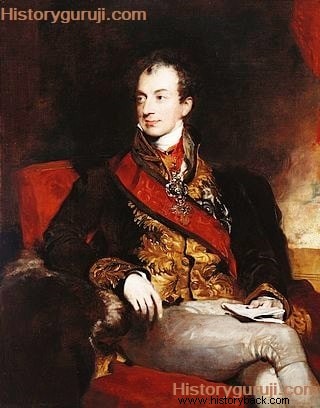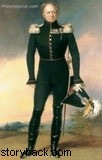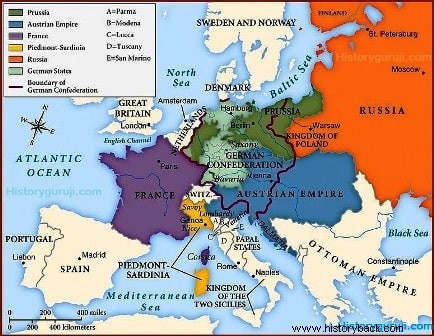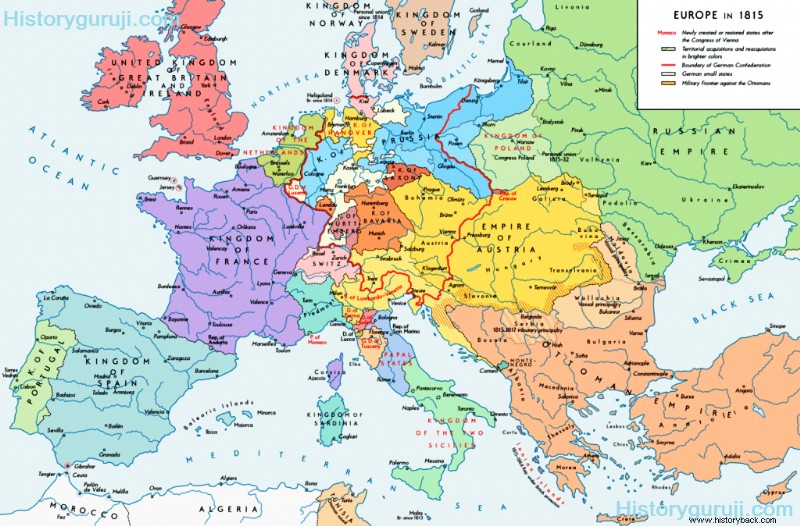Napoleon Bonaparte changed the entire European map with his conquest. After his defeat, various tensions and conflicts played a decisive role in Europe. There was a tussle between the forces of continuity and change. Monarchy, church, feudalism and the desire for peace and stability after twenty-five years of turmoil were the nourishing forces of the status quo. The growing population, industrial development, growth and development of cities, ideas born and developed and spread due to nationalism and revolution were the agents of change. This conflict of continuity and change decided Europe after Napoleon.
Vienna Congress
The representatives of the victorious nations—Britain, Austria, Russia, Prussia, etc.—to solve the political problems and changes arising out of Napoleon's conquests and to rearrange other countries of Europe and Due to the growing influence of Metternich, politicians organized a historic congress in the Austrian capital Vienna, which was called 'Vienna Congress' is called. The Vienna Congress is a link leading Europe from the Napoleonic era to the Metternich era. While Napoleon had an indelible mark on the first fifteen years of the nineteenth century, Metternich, the Austrian chancellor (prime minister) dominated Europe for thirty-three years after that. Napoleon used to say that the people of France are hungry for equality, not freedom , Metternich said that Europe wants peace, not freedom. At the Congress of Vienna, an attempt was made to restore the values of the ancient order as far as possible by burying Napoleon and the Revolution.
England, Austria, Prussia and Russia signed the Treaty of Schomön in March 1814 against Napoleon. According to this, even after the defeat of Napoleon, he had to cooperate for the implementation of regional and political decisions for twenty years. Battle of Leipjing in October 1813 AD After the defeat of Napoleon in 1792, by the First Liberal Treaty of Paris with France in May 1814, it was granted a border in 1792 and the old dynasty was restored to France. Thus the Vienna Congress began on 1 November 1814. It had just begun. But then Napoleon returned from Elba and the Congress had to be adjourned for some time. Battle of Waterloo (8 June 1815 AD) The Vienna Congress session resumed after Napoleon was defeated and finally settled in St. Helena.
The process of Congress, which began in Vienna, continued to Verona, in the direction of the reorganization of Europe and the maintenance of a united organization for the protection of that system. Austria and Russia were mainly active in the conferences held in the meantime. Sometimes other countries like France and Prussia also made significant contributions. This sequence of congresses is considered historic despite its failures in introducing the international order. The foundation stone of the European polity of the nineteenth century was laid in the Vienna Convention itself.
The Main Objectives of Vienna Congress
All the delegates present in Vienna were terrified of the revolution and Napoleon, so they wanted to make such arrangements that the events of 1789 to 1815 would not be repeated and peace prevailed in Europe. Napoleon had changed the political map of the whole of Europe, especially the central part of Europe through his wars, so the Vienna Congress had to rebuild Europe and rearrange the borders of many countries. Napoleon ended many states and destroyed their dynasties. The Vienna Congress was to restore those states and their dynasties. The Holy Roman Empire was dissolved. Napoleon also made many changes in Italy and Germany. There were problems of territoriality relating to Poland, Holland, Belgium, Finland etc. The most important and necessary thing was complete and lasting peace in Europe after twenty-three years of continuous wars, this was the main objective of the Congress of Vienna.
Actually the leaders of the Vienna Congress were unanimous in defeating Napoleon and wanted to build a circle of such powerful states around France so that in future France would dominate some other country. could not attack again and the peace-order and balance of power of Europe remained. But due to personal interest in the reorganization of different countries, there was difference of opinion among them. The victorious nations also wanted something in return for defeating Napoleon in the war. Austria wanted to annex Italy, the Czar of Russia had its eyes on Poland, Prussia wanted to annex the Kingdom of Saxony and England was unwilling to return the French colonies won at any cost. Similarly, small states also had their own interests and interests. Conflict of mutual interests sometimes led to the dissolution of the Vienna Congress, such as the problem of Poland and Saxony.
Napoleon Bonaparte
Main Representatives of Vienna Congress
The Congress of Vienna was the first major conference in European history, attended by a total of 90 great rulers and 63 kings or their representatives. But Turkey did not participate in the Vienna Congress. Although the princes and statesmen of many countries were present in Vienna, the kings of Russia, Prussia and Austria, the Duke of Wellington of England and the foreign minister Casselria and the French diplomat Talirán had a secondary position in the glare of other European royals. The details of representatives of some influential countries are as follows-
Meternich of Austria

The main facilitator of the Vienna Congress is the Austrian representative Prime Minister Metternich was. Metternich was an exceptionally talented European political player who was so dominant in European politics from 1815 to 1848 after the fall of Napoleon that the thirty-three years leading up to his downfall were called the 'Meternich period> ' is called. A staunch reactionary, Metternich was a staunch opponent of liberty and equality. His main objective was to maintain the honor and power of Austria and he also got success in this task.
Alexander I of Russia

Russian Representative Tsar Alexander I role at Vienna Congress was also very important. The Czar did not have the same political and diplomatic qualities as Metternich. He was an imaginative, volatile, arrogant, easily impractical person. Castlerea wrote to his prime minister from Vienna that 'the greatest danger lies with the Tsar, who is very fond of Paris. In contrast to the autocratic rule of his country, he seeks to appease himself and impress others by adopting a policy of generosity and tolerance. There seemed to be an advantage. He used to say:'God has not given me an army of eight lakhs just to fulfill my ambitions.' Whereas the reality was the opposite. In Vienna he was busy creating a pious organization of European states based on more Christian principles than treaty. Gantz said that he went to Vienna only to get praise. Metternich makes him 'crazy' understood, but he was a mighty ruler whose power terrified England and Austria.
Casleria and Duke of Wellington of England
England was represented by Foreign Minister Castlerea and the Duke of Wellington. The Duke of Wellington had played a major role in defeating Napoleon, so he was considered the best general after the fall of Napoleon. But the responsibilities of diplomacy rested with Casselria. Casselria was an introvert, though capable, but because of his skeptical nature, he even brought his own cook along. Casselria did not deceive others like Metternich, but she too was difficult to deceive. He was particularly concerned about the colonial interests of England and was successful in protecting them. Castlerea was the only place after Metternich in the Vienna Congress.
France's Talisman
Among those who played a decisive role in the Vienna Congress was the representative of France, who began his life as a clergyman. During the revolution, he left the post of the church and became a revolutionary. With the rise of Napoleon, he became anti-revolutionary and was the Foreign Minister of France under Napoleon from 1797 to 1807 AD. Due to his opposition to the invasion of Spain and Portugal, he had a rift with Napoleon. Napoleon Talirán 'Dung dung wrapped in silk cloth Da used to say. On the strength of his diplomacy, Talirán was very skillfully successful in getting the principle of legitimacy accepted in the Congress. It also earned him respect which was a testament to his worth.
In addition Francis of Austria, Frederick William, ruler of Prussia, along with Hardenberg and Humboldt, the anti-Napoleonic reformer Stein of Prussia and many kings, princes and diplomats were also present in Vienna. Were. Hardenberg of Prussia believed in nationalism and militarism. His only aim was to make his country powerful.
Main Principles of Vienna Congress
The decisions of the Congress of Vienna cannot be called just. The reason for this was that both the basis and methodology of decision-making of the Vienna Congress were immoral. Decisions were taken on important issues like the boundaries of the nation while enjoying a colorful program in Vienna. Nevertheless, decisions were taken in the Vienna Congress based largely on the following four principles -
Principle of Validity
The principle of legitimacy was the main basis of the decision of the Vienna Congress. This doctrine was passed by Talirán of France in collaboration with Metternich as he wanted to restore the Bourbo dynasty in France. According to the principle of legitimacy, old dynasties were restored in those states of Europe that had been deposed due to the French Revolution or the Napoleonic Wars. In the name of restoring the kings removed by Napoleon, Louis 18th of the Bourbo dynasty was put on the throne in France. But this principle was not accepted where it was not in the interest of the winners.
Principle of Balance of Power
A basis of the decision of the Vienna Congress was the principle of the balance of power, which was specifically designed with France in mind. European countries were fed up with the Napoleonic wars, so they wanted to make such arrangements by which a lasting peace could be established. On the basis of this principle, curbs on France. Small countries such as Holland and Belgium were combined to form strong nations around it.
Principle of Indemnity
The third basis of the decision of the Vienna Congress was the principle of indemnity. The nations of Europe that had faced Napoleon had suffered heavy losses. According to this principle, compensation was taken from France to compensate for the losses of the countries participating in the struggle against Napoleon.
Principle of Rewards and Punishments
The fourth basis of the decision of the Vienna Congress was the principle of rewards and punishments. On the basis of this principle, rewards were given to those who defeated Napoleon and those who helped Napoleon, e.g. Denmark, which had assisted Napoleon, was snatched from Norway and given to Sweden because Sweden helped the Allies. was.
But at the Vienna Congress, no ethical standards were adopted in following these principles and they were disregarded where necessary. Initially Metternich and the representatives of the other conquerors - England, Russia, Austria and Prussia wanted to conduct the Congress as they wished to serve their respective interests, but the extraordinary diplomatic efforts of French's Talirán Due to this, a committee of eight states - England, Austria, Russia, Prussia, France, Spain, Portugal and Sweden was formed and in January 1815, France was given the fifth state It was accepted. Although there are 18 subcommittees to address specific problems. was announced, but the Vienna Congress was dominated by only five elders. Formal approval was obtained from other delegates Spain, Portugal and Sweden. In fact the Vienna Congress was not a Congress at all; यह तो केवल लूट के माल का बँटवारा करनेवालों का जमघट मात्र था।
फ्रांस के चरमोत्कर्ष का काल :लुई XIV का युग (The Climax Period of France :The Era of Louis XIV)
वियेना कांग्रेस के प्रमुख निर्णय (Major Decisions of Vienna Congress)

वैधता के सिद्धांत के आधार पर फ्रांस पर बूर्बो वंश का अधिकार स्वीकार किया गया। लुई सोलहवाँ और उसके पुत्र की मृत्यु हो चुकी थी, इसलिए उसके भाई लुई अठारहवें को फ्रांस के शासक के रूप में प्रतिष्ठित किया गया।
फ्रांस से संबंधित अन्य निर्णयों में नेपोलियन की पत्नी मारी लुइजा को परमा की रियासत दी गई।
फ्रांस से नेपोलियन द्वारा या उससे पहले जीते गये सभी प्रदेशों को छीन लिया गया और फ्रांस की सीमा वही कर दी गई जो 1791 ई. में थी।
फ्रांस में फ्रांस के व्यय पर वेलिंगटन के नेतृत्व में मित्र राष्ट्रों की 1,50,000 सेना पांच वर्ष के लिए रख दी गई। युद्ध के हर्जाने के रूप में फ्रांस को 70 करोड़ फ्रें क (लगभग 1400 लाख डालर) मित्र राष्ट्रों को पाँच वर्ष में देने थे।
शक्ति-संतुलन बनाये रखने के लिए फ्रांस के उत्तर में हालैंड को बेल्जियम का प्रदेश देकर सुदृढ़ किया गया और हालैंड में आरेंज परिवार को पुनर्स्थापित किया गया। फ्रांस के दक्षिण-पूर्व में साडीर्निया के राज्य को मजबूत करने के लिए उसे पीडमांट, सेवाय, नीस, जिनेवा के गणतंत्र लौटा दिये गये। पोप को चर्च का राज्य वापस मिल गया।
चूकिं पवित्र रोमन साम्राज्य को पुनर्जीवित करना असंभव था, इसलिए जर्मनी में 38 राज्यों का एक ढीला-ढाला संघ बनाया गया और उसका नेतृत्व आस्ट्रिया को सौंपा गया।
स्पेन में बूर्बो वंश की स्थापना की गई और नेपल्स में भी प्राचीन राजवंश को पुनर्स्थापित किया गया।
आस्ट्रिया को लोंबार्डी और वेनिशिया के प्रांत वापस कर दिये गये। इलीरिया उसे पहले ही मिल चुका था।
आस्ट्रिया को रूस से पालैंड का गेलेशिया क्षेत्र और बवेरिया से टाइरोन का प्रदेश भी दिलाये गये। इससे आस्ट्रिया को अपनी खोई हुई शक्ति और प्रतिष्ठा पुनः मिल गई।
प्रशा को रेमिश का प्रांत वापस मिल गया। साथ ही उसे कोलोन, त्रैव तथा स्वीडेन का पामेरेनिया क्षेत्र भी दिया गया। दंड के रूप में सैक्सनी का एक हिस्सा भी प्रशा को दिया गया। इस प्रकार सैक्सनी को सजा मिल गई और प्रशा को पुरस्कार। प्रशा के हिस्से का पोलैंड रूस के ही कब्जे में छोड़ दिया गया।
स्वीडेन के शासक बर्नदात ने नेपोलियन के विरुद्ध मदद की थी, इसलिए उसे नार्वे दिया गया।
रूस को फिनलैंड और अपने हिस्से का पोलैंड वापस मिल गया।
स्विट्जरलैंड स्वतंत्र गणतंत्र मान लिया और उसमें तीन और कैंटन जोड़ दिये गये।
हैनोवर को एक स्वतंत्र राज्य मान लिया गया।
नेपोलियन के साथ हुए युद्धों में सबसे अधिक इंग्लैंड जूझता रहा था, इसलिए हेलिगोलैंड, मारीशस, माल्टा, ट्रिनिडाड, टोबैगो तथा लंका और अफ्रीका के दक्षिण स्थित उत्तमाशा अंतरीप पर इंग्लैंड का प्रभुत्व स्वीकार किया गया। बदले में इंग्लैंड ने हालैंड को साठ लाख पौंड मुआवजे के रूप में दिया।
इन क्षेत्रीय प्रावधानों के अलावा वियेना में कुछ सामाजिक-आर्थिक महत्व के निर्णय भी लिये गये। इंग्लैंड ने पहले ही गुलामी प्रथा का अंत कर दिया था। वियेना में हालैंड, फ्रांस और स्पेन ने भी दासता की प्रथा का उन्मूलन करना स्वीकार किया।
भूमध्य सागर में बारबेरी कोरसैर्स नामक समुद्री लुटेरों ने आतंक मचा रखा था। वियेना कांग्रेस के निर्णय के अनुसार ब्रिटिश नौसेना ने भूमध्यसागरीय डाकुओं पर संगठित रूप से प्रहार कर न केवल उनका अंत कर दिया बल्कि हजारों ईसाई बंदियों को भी उनकी कैद में मुक्त करवाया।
यूरोप की अंतर्राष्ट्रीय नदियों में जहाजरानी के नियम बनाये गये। पहली बार राष्ट्रों के पारस्परिक संबंधों पर विचार हुआ और अंतर्राष्ट्रीय कानून के क्रियान्वयन का निर्णय लिया गया।
वियेना कांग्रेस के निर्णयों का मूल्यांकन (Evaluation of the Decisions of Vienna Congress)

नेपोलियन के युद्धों से त्रस्त यूरोप को वियेना कांग्रेस से बड़ी उम्मीदें थीं। यद्यपि वियेना कांग्रेस शांति स्थापित करने में तो सफल रही, किंतु वियेना में लिये गये अनेक निर्णय अनुचित, अनैतिक अन्यायपूर्ण थे। वियेना कांग्रेस के निर्णय एक सदी बाद ही खत्म हो गये क्योंकि वियेना में राजनीतिज्ञों ने इतिहास की धारा को अवरूद्ध करने का प्रयास किया था। मेटरनिख के नेतृत्व में हर जगह प्रजातंत्र और राष्ट्रवाद का गला घोंटा गया। बेल्जियम फ्रांस, नार्वे, पोलैंड और इटली में जनांकांक्षाओं को पूर्णतः नजरअंदाज किया गया।
Concert of Europe:The First Step Towards Peace
वियेना कांग्रेस प्रतिक्रियावादी शक्तियों की विजय Was. वहां एकत्र लोगों का दृढ़ निश्चय था कि क्रांति और राष्ट्रीयतावादी शक्तियों को सिर नहीं उठाने देंगे। तालिरां ने वैधता के सिद्धांत के माध्यम से फ्रांस में पुरातन व्यवस्था को पुनर्जीवित करना चाहा था। लेकिन वहाँ भी राजवंशों के हित के लिए राष्ट्रीयता के सिद्धांत की अनदेखी की गई। नार्वे स्वीडेन के साथ मिलने के लिए तैयार नहीं था और बाद में वहाँ स्वतंत्र राज्य की स्थापना हुई। इसी तरह बेल्जियम ने भी हालैंड में विलय का विरोध किया और बाद में उसने अपनी स्वतंत्रता हासिल कर ली। जर्मनी में आस्ट्रिया का हस्तक्षेप बना रहा। इस प्रकार वैधता का सिद्धांत धूर्ततापूर्ण, और केवल कुछ परिवारों के पक्ष में था।
पुरस्कार, मुआवजे और दंड के सिद्धांत को भी विजेताओं ने अपने लाभ और स्वार्थ के आधार पर अन्यायपूर्ण ढ़ंग से लागू किया। कहीं इनके लिए देश चुने गये तो कहीं राजा, जैसे- फ्रांस से मुआवजा तो लिया गया, लेकिन दंड केवल नेपोलियन को मिला, फ्रांस को नहीं। सैक्सनी में मामले में शासक को दंड न देकर उस राज्य को ही बाँट दिया गया ताकि विजेताओं को पुरस्कार दिया जा सके। पोलैंड के साथ भी मनमाना व्यवहार किया गया। पुरस्कार और सजा का कोई एक मापदंड नहीं रखे जाने से वियेना सम्मेलन के सचिव गेंज ने कहा है कि ’वास्तव में कांग्रेस का लक्ष्य विजित प्रदेशों के लूट के माल का बँटवारा करना मात्र था। '
शक्ति-संतुलन का सिद्धांत भी फ्रांस के अलावा किसी अन्य देश पर लागू हो पाया। वास्तविकता यह थी कि यूरोप में सबसे शक्तिशाली देश इंग्लैंड की शक्ति न केवल अक्षुण्ण रही बल्कि उसका विस्तार भी हुआ। बड़ें देशों, विशेषकर प्रशा, रूस और फ्रांस ने जब आवश्यक समझा तो शक्ति-संतुलन के सिद्धांत की अवहेलना की। हेजेन का कहना है कि वियेना में उच्च आदर्शों का अभाव और स्वार्थों का बोलबाला था। 1815 के बाद संपूर्ण उन्नीसवीं सदी का यूरोपीय इतिहास वियेना कांग्रेस की इन्हीं भूलों को सुधारने के प्रयत्नों का इतिहास है।
प्रतिक्रियावादी युग का महान नायक:मेटरनिख (Great Hero of the Reactionary Era:Metternich )
यद्यपि किसी भी अंतर्राष्ट्रीय समझौते और संधि की तरह वियेना की संधि भी मोलतोल और आपसी समझौतों का परिणाम थी। फिर भी, अपनी तमाम कमियों के बावजूद वियेना कांग्रेस में कुछ ऐसे निर्णय भी लिये गये जो व्यवहारिक और दूरदर्शितापूर्ण थे। डेविड टामसन के अनुसार वियेना संधि पर राजनैतिक सूझ-बूझ और तर्कसंगतता की छाप थी। तत्कालीन यूरोप को सबसे अधिक शांति की आवश्यकता थी और और इस मामले में कांग्रेस सफल रही क्योंकि लगभग अगले 40 वर्षों तक यूरोप में कोई बड़ा युद्ध नहीं हुआ। इसके बाद युद्ध हुआ भी तो सुदूर क्रीमिया के दलदल में। सबसे बड़ी महत्वपूर्ण बात यह थी कि वियेना सम्मेलन में फ्रांस के प्रति उदार नीति अपनाई गई और पहली बार वियेना कांग्रेस में अंतर्राष्ट्रीय सहयोग पर आधारित एक संयुक्त यूरोपीय व्यवस्था ( Concert of Europe ) का गठन किया गया जो बाद में राष्ट्रसंघ और संयुक्त राष्ट्रसंघ का अग्रगामी सिद्ध हुआ।
वियेना कांग्रेस के प्रतिनिधियों ने दास प्रथा, नाविक व्यापार की स्वतंत्रता आदि प्रश्नों पर विचार करके और उस पर सक्रिय कदम उठाने का निर्णय करके यूरोप के नवनिर्माण की भावना तथा अंतर्राष्ट्रीय दृष्टिकोण की उदारता का परिचय दिया। कांग्रेस की प्रशंसा करते हुए मेरिएट लिखते हैं कि यद्यपि कांग्रेस के कार्य प्रतिक्रियावादी थे, किंतु इससे एक पुराने युग की समाप्ति और नये युग का आरंभ होता है।
<नेपोलियन बोनापार्ट (Napoleon Bonaparte)
>यूरोप की संयुक्त-व्यवस्था :शांति की ओर पहला कदम (Concert of Europe :The First Step Towards Peace)
